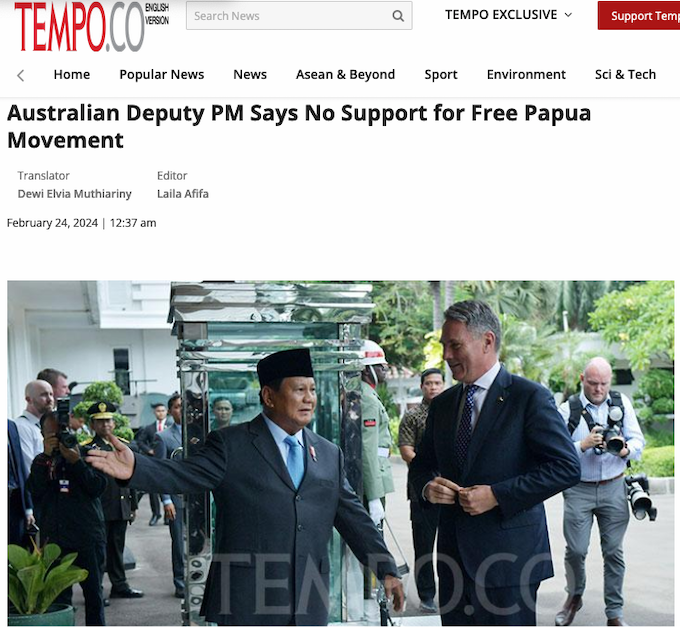
By Duncan Graham
An alleged plot involving firearms and threatening the life of New Zealand pilot Philip Mehrtens when held hostage in Papua this year is being investigated by the Australian Federal Police.
The case involves “advancing a political cause by the separation of West Papua from Indonesia . . . with the intention of coercing by intimidation the governments of New Zealand and Indonesia”.
Named in the AFP search warrant seen by MWM is research scholar Julian King, 63, who has studied and written extensively about West Papuan affairs.
- READ MORE: Plea to bar Prabowo from UK as Indonesian security forces crack down on Papuan rally
- ‘If it’s not racism, what is it?’ — Human Rights Watch report
- Prabowo and the UK
- Other West Papua reports
He has told others his home in Coffs Harbour, Queensland, was raided violently earlier this month by police using a stun grenade and smashing a door.
During the search, the police seized phones, computers and documents about alleged contacts with the West Papua rebel group Organisasi Papua Merdeka, OPM (Free Papua Organisation) and a bid to seek weapons and ammunition.
However, no arrests are understood to have been made or charges laid.
King, a former geologist and now a PhD student at Wollongong University, has been studying Papuan reaction to the Indonesian takeover since 1963. He has written in a research paper titled “A soul divided: The UN’s misconduct over West Papua” that West Papuans:
‘live under a military dictatorship described by legal scholars and human rights advocates as systemic terror and alleged genocide.’
Also named in the warrant alongside King is Amatus Dounemee Douw, confirmed by MWM contacts to be Australian citizen Akouboo Amatus Douw, who chairs the West Papua Diplomatic and Foreign Affairs Council, an NGO that states it seeks to settle disputes peacefully.
Risk to Australia-Indonesia relations
The allegations threaten to fragment relations between Indonesia and Australia.
It is widely believed that human rights activists and church organisations are helping Papuan dissidents despite Canberra’s regular insistence that it officially backs Jakarta.
Earlier this year, Deputy PM Richard Marles publicly stressed: “We, Australia, fully recognise Indonesia’s territorial sovereignty. We do not endorse any independence movement.”
In August, Douw alleged Indonesian troops shot Kiwi Glen Conning on August 5 in Central Papua. The government version claims that the pilot was killed by “an armed criminal group” after landing his helicopter, ferrying local people who fled unharmed.
When seized by armed OPM pro-independence fighters in February last year, Mehrtens was flying a light plane for an Indonesian transport company.
He was released unharmed in September after being held for 593 days by the West Papua National Liberation Army (Tentara Pembebasan Nasional Papua Barat – TPNPB), the military wing of the OPM.
AFP is investigating alleged firearms plot which threatened the life of New Zealand pilot Philip Mehrtens when held hostage in West Papua this year #auspol https://t.co/8ZXFIB1fre
— 💧Michael West (@MichaelWestBiz) November 18, 2024
Designated ‘terrorist’ group, journalists banned
OPM is designated as a terrorist organisation in Indonesia but isn’t on the Australian list of proscribed groups. Jakarta bans foreign journalists from Papua, so little impartial information is reported.
After Mehrtens was freed, TPNPB spokesman Sebby Sambom alleged that a local politician had paid a bribe, a charge denied by the NZ government.
However, West Papua Action Aotearoa spokesperson Catherine Delahunty told Radio NZ the bribe was “an internal political situation that has nothing to do with our government’s negotiations.”
Sambom, who has spent time in Indonesian jails for taking part in demonstrations, now operates out of adjacent Papua New Guinea — a separate independent country.
Australia was largely absent from the talks to free Mehrtens that were handled by NZ diplomats and the Indonesian military. The AFP’s current involvement raises the worry that information garnered under the search warrants will show the Indonesian government where the Kiwi was hidden so that locations can be attacked from the air.
At one stage during his captivity, Mehrtens appealed to the Indonesian military not to bomb villages.
It is believed Mehrtens was held in Nduga, a district with the lowest development index in the Republic, a measure of how citizens can access education, health, and income. Yet Papua is the richest province in the archipelago — the Grasberg mine is the world’s biggest deposit of gold and copper.
OPM was founded in December 1963 as a spiritual movement rejecting development while blending traditional and Christian beliefs. It then started working with international human rights agencies for support.
Indigenous Papuans are mainly Christian, while almost 90 percent of Indonesians follow Islam.
Chief independence lobbyist Benny Wenda lives in exile in Oxford. In 2003 he was given political asylum by the UK government after fleeing from an Indonesian jail. He has addressed the UN and European and British Parliaments, but Jakarta has so far resisted international pressure to allow any form of self-determination.
Questions for new President Prabowo
Indonesian President Prabowo Subianto is in the UK this week, where Papuans have been drumming up opposition to the official visit. In a statement, Wenda said:
‘Prabowo has also restarted the transmigration settlement programme that has made us a minority in our own land.’
“For West Papuans, the ghost of (second president) Suharto has returned — (his) New Order regime still exists, it has just changed its clothes.”
Pleas for recognition of Papuan’s concerns get minimal backing in Indonesia; fears of balkanisation and Western nations taking over a splintered country are well entrenched in the 17,000-island archipelago of 1300 ethnic groups where “unity” is considered the Republic’s foundation stone.
Duncan Graham has a Walkley Award, two Human Rights Commission awards and other prizes for his radio, TV and print journalism in Australia. He now lives in Indonesia. He has been an occasional contributor to Asia Pacific Report and this article was first published by Michael West Media.











































